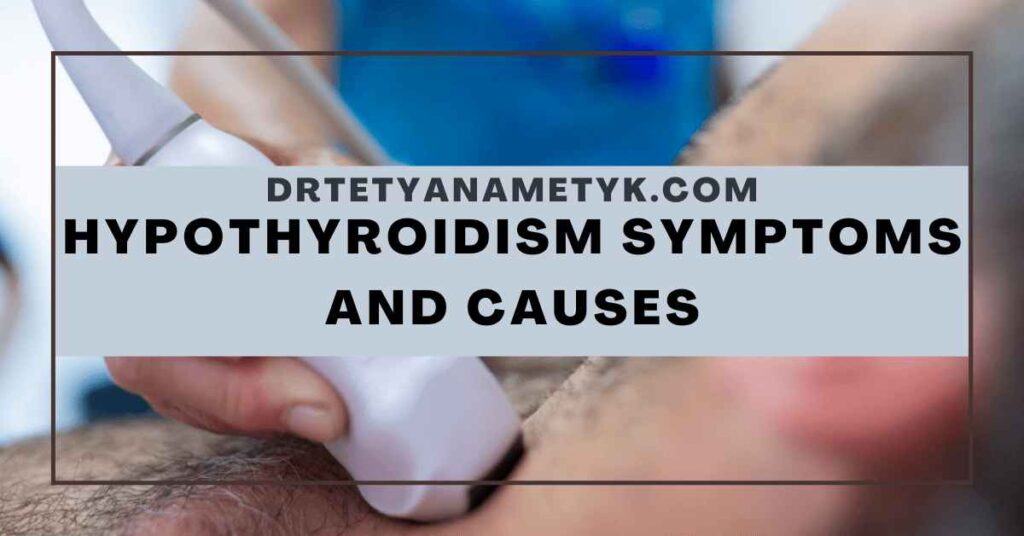Hypo means less or lower. Hypothyroidism is a condition in which thyroids are less active. In hypothyroidism, the thyroid glands do not produce the crucial hormones in a sufficient amount. It is a common condition that can be stated as underactive thyroids, which do not produce thyroid hormones and release them into the bloodstream. Hypothyroidism symptoms are not clearly visible in the early stages, but they can cause severe symptoms if the condition worsens. There are several tests on which treatment is decided for a patient.
This blog contains information about symptoms of hypothyroidism and its causes and if you have underactive thyroid glands, take help from this blog.
What is hypothyroidism?
Thyroid glands are present in the shape of a butterfly in the front of our neck. They produce crucial hormones called thyroid hormones, triiodothyronine (T3), and thyroxine (T4). These are iodine-based hormones. In hypothyroidism, thyroid glands are underactive and do not produce enough amount of thyroid hormones and release fewer thyroid hormones into the bloodstream. These hormones are responsible for metabolism and heart rate. The thyroid hormonal level (TSH) can be checked through blood tests if the condition gets worst. The thyroid glands enlarge in size and are known as goiter.
Hypothyroidism Symptoms
The symptoms of hypothyroidism are different in every stage of life and with the thyroid glands’ condition. Hypothyroidism can affect an individual of any age, and thus symptoms of hypothyroidism vary. The common hypothyroidism symptoms are fatigue, constipation, weight gain, muscle weakness, and abnormal heart rate. If hypothyroidism remains untreated, it can become myxedema coma.
Hypothyroidism Symptoms In infants
In infants, the symptoms of hypothyroidism are less noticeable. There is less bilirubin production by the liver, resulting in yellowing of skin and eyes, which occurs in jaundice. The other symptoms of hypothyroidism are protruding tongue, umbilical hernia. Constipation, imbalance sleep patterns, and hoarse voice. If the levels are lower, brain development is also slow.
Hypothyroidism Symptoms In children and teens
Children and teens can experience the same hypothyroidism symptoms as adults. Still, additional symptoms may include short stature due to poor growth, permanent teeth are developed late, delayed puberty, and mental development are retarded. The other symptoms are difficulty in breathing, brittle nails, hoarse voice, constipation, weight gain, muscle soreness, and fatigue.
Hypothyroidism Symptoms In adults
In adults, the hypothyroidism symptoms are different in every patient. Any person can experience all or some of the following symptoms, which are tiredness, numbness or tingling in hands, constipation, weight gain due to slow metabolism, muscle weakness, higher cholesterol levels in the blood, cold sensitivity, dry skin and hair, less sexual interests, puffy face, drooping eyelids and hoarser voice, the mental health is also disturbed, and the patient may become more forgetful. The other symptoms are heart problems and breathing issues. Enlargement of thyroid glands known as goiter, which can be easily seen from the above, is a symptom of the worst stage.
Causes of hypothyroidism
Hashimoto’s disease
Hashimoto’s disease is a common cause of hypothyroidism, and it is an autoimmune disorder. It is also known as Hashimoto’s thyroiditis. In this condition, the body produces antibodies, and the immune system attacks the thyroid glands. The tissues of thyroid glands become inflamed and thus do not remain active properly and produce fewer thyroid hormones.
Treatment of hyperthyroidism
Hyperthyroidism is a condition in which thyroid glands are overactive and produce excess thyroid hormones. The treatment of hyperthyroidism, such as medications, radioactive iodine treatment, surgery, i.e., partial, or complete removal of thyroid glands, can cause hypothyroidism. The medicines to treat hyperthyroidism, such as lithium, can significantly contribute to hypothyroidism occurrence. In radioactive iodine treatment, radioactive isotope Iodine-131 is given to the patient as a pill, which will go into the bloodstream and, after some days, shrink the thyroid glands. Lastly, it completely destroys the gland tissues. The doctors prescribe this when the antithyroid medicine does not work correctly in lowering the thyroid glands’ activity.
Iodine deficiency
Iodine is a mineral present in the body in trace amounts. Deficiency of Iodine is a common cause of hypothyroidism. When the iodine level falls in the body, it leads to hypothyroidism. Excess iodine levels are the reason for hyperthyroidism as iodine is an essential component of thyroid hormones. The iodine deficiency can be made up by eating seafood, plants rich in iodine such as spinach, and the plants which are grown in iodine-rich soil, seaweeds, and iodized salt.
Postpartum thyroiditis
In most pregnant ladies, the chances of Hashimoto’s thyroiditis increase. The result of which is that the thyroid hormones are not produced in adequate amounts for the baby and the mother. It can significantly affect the baby as it is essential for the baby’s development and the nervous system and brain. It is necessary to control thyroid levels during pregnancy to avoid complications like the underdeveloped brain of the baby, miscarriage, and preterm labor.
Use of contraceptives
Contraceptives or birth control pills also cause hypothyroidism. The tablets contain estrogen and progesterone hormones that affect thyroid-binding proteins. This will lead to hypothyroidism as thyroid hormones level decrease in the blood. If you are on contraceptives, consult your doctor and ask them to prescribe you a medication. The dosage must be lowered once you stop taking contraceptives.
Stress
Everyone is suffering from stress and anxiety issues these days due to chaotic life. Still, the stress above the manageable level is another reason for hypothyroidism as in chronic stress, the body produces hormones named cortisol which has destructive effects on thyroids, and thyroid glands are under pressure to make more thyroid hormones to balance the cortisol amounts. This imbalance the thyroid glands and leads to hypothyroidism.
Conclusion
The detailed information about hypothyroidism, symptoms which show that you are suffering from hypothyroidism at any stage of life and what are the causes of hypothyroidism which include Hashimoto’s disease, iodine deficiency which is the most common reason, thyroiditis after childbirth and pregnancy, and use of contraceptives. Have a look at it and get help if you are suffering from hypothyroidism.
For further information about hypothyroidism symptoms, you can visit our Website or Contact Us to book an appointment with a specialist doctor. Dr. Tetyana Metyk is an experienced professional Internal medicine doctor. She can guide and assist you in hypothyroidism treatment.

